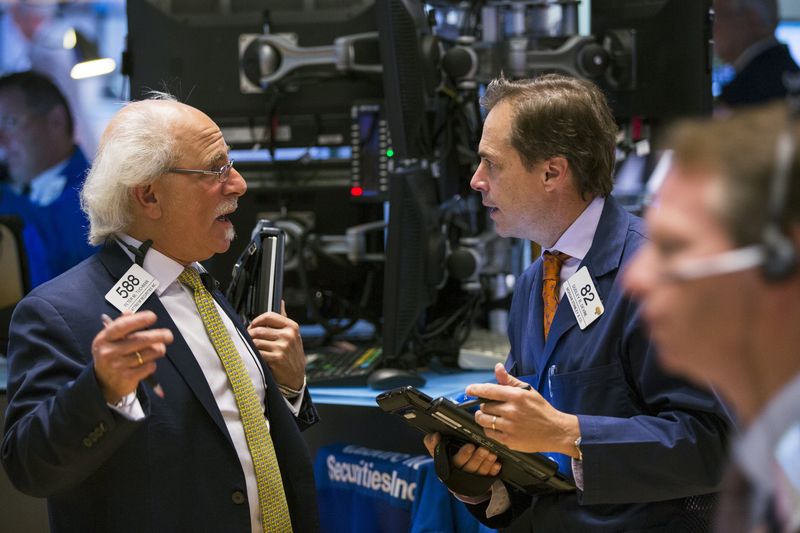Investing.com - Here are the top five things you need to know in financial markets on Monday, April 16:
1. U.S. Set To Slap New Sanctions On Russia
The Trump administration plans to impose new sanctions against Russia over its support for Syrian President Bashar Assad, the latest in a series of actions by both sides underscoring the deterioration in relations between Moscow and the West.
U.S. Ambassador to the United Nations Nikki Haley told CBS's "Face the Nation" that the Treasury Department will announce the new sanctions on Monday and insisted the U.S. has sent "a strong message" about the use of chemical weapons.
The fresh sanctions would be the third round enacted by the Trump administration against Russia in the past four weeks.
Last week, U.S. measures introduced against Russian tycoons and businesses triggered a sell-off in the ruble and sent the Russian stock market cascading lower.
2. U.S. Stock Futures Point To Higher Open
U.S. stock futures pointed to a higher open, as investors expected there would be no immediate military escalation in Syria following the weekend's American-led strike.
The U.S., U.K. and France launched more than 100 missiles targeting Syrian government sites on Saturday in response to a suspected poison gas attack on April 7.
Suggesting that the military action would not be prolonged, President Donald Trump hailed the attack as "perfectly executed," while adding that the military campaign to degrade the Assad regime's chemical weapons capability had accomplished its goals.
The blue-chip Dow futures rose 150 points, or about 0.6%, the S&P 500 futures tacked on 16 points, or nearly 0.6%, while the tech-heavy Nasdaq 100 futures advanced 44 points, or roughly 0.7%.
U.S. stocks fell on Friday, as results from big banks failed to provide enthusiasm and fear of broader conflict in Syria further unnerved investors.
Despite Friday's decline, the major averages still posted strong gains for the week. The Dow and S&P 500 rose 1.8% and 2% respectively, while the Nasdaq advanced 2.8%.
In Europe, the continent's major bourses were little changed, with most sectors moving in opposite directions.
Earlier, in Asia, most markets in the region closed lower, led by declines in Hong Kong and mainland China over worries about the Hong Kong dollar.
3. Oil Prices Sink
Oil prices started the week in negative territory, amid indications that weekend missile strikes against Syria by the United States, France and Britain may be a one-off event.
A rise in U.S. drilling for new production also dragged on prices. Analysts and traders have recently warned that booming U.S. shale oil production could potentially derail OPEC's effort to end a supply glut.
New York-traded WTI crude futures sank $1.11, or about 1.6%, to $66.28 per barrel, while Brent futures slumped $1.27, or roughly 1.7%, to $71.33 per barrel.
Both benchmarks last week saw their strongest weekly percentage performance since late July of last year, with WTI gaining about 8.6%, while Brent saw a weekly increase of 8.2%.
4. Bank of America, Netflix Kick Off Busy Week Of Earnings
A handful of Dow components report in the week ahead, along with dozens of S&P 500 companies, in what will be the first big week of the first-quarter earnings season.
Earnings growth is expected to be up about 18.5%, according to Thomson Reuters data, the highest in seven years, as results are likely to have been boosted by President Donald Trump's tax cuts.
Bank of America (NYSE:BAC) reports Monday, along with tech darling Netflix (NASDAQ:NFLX).
Results from Goldman Sachs (NYSE:GS), Morgan Stanley (NYSE:MS), American Express (NYSE:AXP), IBM (NYSE:IBM), Johnson & Johnson (NYSE:JNJ), Procter & Gamble (NYSE:PG) and UnitedHealth (NYSE:UNH) are also on the agenda for this week.
The first three major banks, JP Morgan Chase (NYSE:JPM), Citigroup (NYSE:C) and Wells Fargo (NYSE:WFC), to report earnings Friday all beat expectations. But their stocks traded lower, as the strong results were already priced in.
5. U.S. Retail Sales, Fed Speakers In Focus
The Commerce Department will publish data on retail sales for March at 8:30AM ET (12:30GMT).
The consensus forecast is that the report will show retail sales rose 0.4% last month, snapping back after a decline of 0.1% in February.
Core sales are forecast to inch up 0.2%, the same as its rise a month earlier.
Rising retail sales over time correlate with stronger economic growth, while weaker sales signal a declining economy. Consumer spending accounts for as much as 70% of U.S. economic growth.
The Empire State Manufacturing Survey for April is due at the same time, while the NAHB homebuilders' index for the same month is scheduled to come at 10AM ET (1400GMT). A reading on business inventories in February is expected at 10AM ET, too.
On the central bank front, market players will also pay close attention to comments from a trio of Fed speakers for insights into the outlook for monetary policy.
Dallas Fed head Robert Kaplan speaks in Florida at 12:00PM ET (1600GMT) at the International Economic Forum.
At the same time, Minneapolis Fed chief Neel Kashkari will be discussing the notion of "too big to fail" at an event by Howard University.
Finally, Atlanta Fed President Raphael Bostic will speak on the economy and rural market trends to the Shoals Chamber of Commerce in Alabama.
Of the three up on the podium today, only Bostic is a voter in the FOMC.
The dollar index against a basket of six major currencies was 0.3% lower at 89.23.
In the bond market, the U.S. 10-year Treasury yield inched up to 2.856%.
